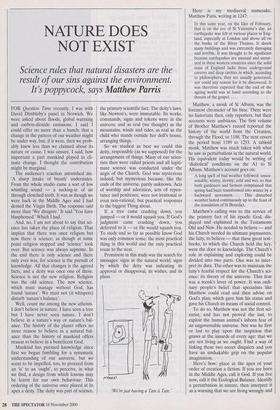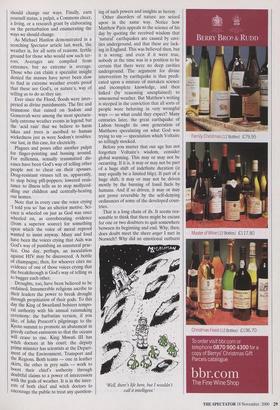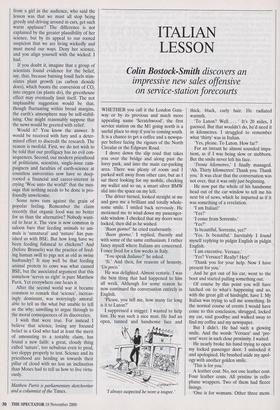NATURE DOES NOT EXIST
Science rules that natural disasters are the result of our sins against the environment.
It's poppycock, says Matthew Parris FOR Question Time recently, I was with David Dimbleby's panel in Norwich. We were asked about floods, global warming and carbon-dioxide emissions. I said I could offer no more than a hunch: that a change in the pattern of our weather might be under way, but, if it were, then we prob- ably knew less than we claimed about its nature or cause. I was unsure, I said, how important a part mankind played in cli- mate change. I thought the contribution might be marginal.
The audience's reaction astonished me. `A sharp intake of breath' understates. From the whole studio came a sort of low whistling sound — a sucking-in of air through clenched teeth. It was as though we were back in the Middle Ages and I had denied the Virgin Birth. The response said more than 'We disagree.' It said 'You have blasphemed.' Which I had.
And, no, I am not about to say that sci- ence has taken the place of religion. That implies that there was once religion but now there is science; as though at some point religion stopped and 'science' took over. But science was always supreme. In the end there is only science and there only ever was, for science is the pursuit of knowledge. All that changes is the agreed facts, and a deity was once one of these. Science is not the new religion. Religion was the old science. The new science, which must manage without God, has found 'nature'. We must not (it whispers) disturb 'nature's balance'.
Well, count me among the new atheists. I don't believe in nature. I have seen a tree but I have never seen nature. I don't believe in a nature's way or nature's bal- ance. The history of the planet offers no more reason to believe in a natural bal- ance than the history of mankind offers reason to believe in a beneficent God.
Mankind has pursued knowledge since first we began fumbling for a systematic understanding of our universe, but we seem to be impelled, too, to proceed from an 'is' to an 'ought', to perceive, in what we find, a design from which lessons may be learnt for our own behaviour. This ordering of the universe once placed at its apex a deity. The deity was part of science, the primary scientific fact. The deity's laws, like Newton's, were immutable. Its works, commands, signs and tokens were in the universe and as real (we thought) as the mountains, winds and tides; as real as the child who stands outside her doll's house, arranging things.
So we studied as best we could this deity, responsible (as we supposed) for the arrangement of things. Many of our scien- tists then were called priests and all legiti- mate science was conducted under the aegis of the Church. God was mysterious indeed, but mysterious because, like the ends of the universe, partly unknown. Acts of worship and adoration, acts of repen- tance and penitence, were not irrational or even non-rational, but practical responses to the biggest Thing about.
If a tree came crashing down, you jumped or it would squash you. If God's judgment came crashing down, you deferred to it — or He would squash you. To study and so far as possible know God was only common sense: the most practical thing in this world and the only practical route to the next.
Prominent in this study was the search for messages: signs in the natural world, signs by which the deity was indicating its approval or disapproval, its wishes, and its plans.
`We're just having a Tate a Tate.' Here is my mediaeval namesake, Matthew Paris, writing in 1247: In this same year, on the Ides of February, that is on the eve of St Valentine's day, an earthquake was felt at various places in Eng- land, especially at London and above all on the banks of the River Thames. It shook many buildings and was extremely damaging and terrible. It was thought to be significant because earthquakes are unusual and unnat- ural in these western countries since the solid mass of England lacks those underground caverns and deep cavities in which, according to philosophers, they are usually generated, nor could any reason for it be discovered. It was therefore expected that the end of the ageing world was at hand according to the threats of the gospel....
Matthew, a monk of St Albans, was the foremost chronicler of his time. There were no historians then, only reporters, but their accounts were ambitious. The first volume of Brother Matthew's record reported the history of the world from the Creation, through the Flood, to 1188. The next covers the period from 1189 to 1253. A tabloid monk, Matthew was much taken with what he saw as perturbations in the natural world. His equivalent today would be writing of `diabolical' conditions on the Al to St Albans. Matthew's account goes on:
A long spell of bad weather followed: unsea- sonable, wintry, stormy, cold and wet, so that both gardeners and fanners complained that spring had been transformed into winter by a backward movement.... This disturbed weather lasted continuously up to the feast of the translation of St Benedict.
Matthew's calling was to the service of the primary fact of his epoch: God, dis- played and explained in the Testaments Old and New. He needed to believe — and his Church needed its ultimate paymasters, the laity, to believe — that these great text- books, to which the Church held the key, were the door to knowledge. The Church's role in explaining and exploring could be divided into two parts. One was to inter- pret its data. The other was to maintain the laity's fearful respect for the Church's sci- ence: its theory of the universe. That fear was a monk's lever of power. It was ordi- nary people's belief that specialists like Matthew could read and then advise on God's plan, which gave him his status and gave his Church its means of social control.
To do so, Matthew was not the first sci- entist, and has not proved the last, to exploit the human animal's inborn fear of an ungovernable universe. Nor was he first or last to play upon the suspicion that gnaws at the innards of every age: that we are not living as we ought. Find a way of linking these two secret disquiets and you have an unshakable grip on the popular imagination.
Here's how: place at the apex of your order of creation a fiction. If you are born in the Middle Ages, call it God. If you live now, call it the Ecological Balance. Identify a perturbation in nature, then interpret it as a warning that we are living wrongly and should change our ways. Finally, earn yourself status, a pulpit, a Commons cheer, a living, or a research grant by elaborating on the perturbation and enumerating the ways we should change.
As Michael Hanlon demonstrated in a scorching Spectator article last week, the weather is, for all sorts of reasons, fertile ground for those who would sow such ter- rors. Averages are compiled from extremes, but no extreme is average. Those who can claim a specialist insight denied the masses have never been slow to find in extreme weather events proof that these are God's, or nature's, way of telling us to do as they say.
Ever since the Flood, floods were inter- preted as divine punishments. The fire and brimstone that rained on Sodom and Gomorrah were among the most spectacu- larly extreme weather events in legend; but the 'acid rain' that we believe to harm lakes and trees is ascribed to human wickedness just as were Sodom's troubles: our lust, in this case, for electricity.
Plagues and poxes offer another pulpit for finger-pointing and bossing around. For millennia, sexually transmitted dis- eases have been God's way of telling other people not to cheat on their spouses. Drug-resistant viruses tell us, apparently, to stop being pill-poppers; lowered resis- tance to illness tells us to stop mollycod- dling our children and centrally-heating our homes.
Note that in every case the voice crying `I told you so' has an ulterior motive. Sci- ence is wheeled on just as God was once wheeled on, as corroborating evidence (from a superior source) for something upon which the voice of moral reproof wanted to insist anyway. Many and loud have been the voices crying that Aids was God's way of punishing an unnatural prac- tice. One day, perhaps, an inoculation against HIV may be discovered. A bottle ofchampagne, then, for whoever cites me evidence of one of those voices crying that the breakthrough is God's way of telling us to bugger each other.
Droughts, too, have been believed to be ordained. Innumerable religions ascribe to their leaders the power to break drought through propitiation of their gods. To this day the King of Swaziland bolsters tempo- ral authority with his annual rainmaking ceremony: the barbarian version, if you like, of John Prescott's pilgrimage to the Kyoto summit to promote an abatement in greedy carbon emissions so that the oceans will cease to rise. King Mswati III has witch doctors at his court; the deputy prime minister has scientists at the Depart- ment of the Environment, Transport and the Regions. Both teams — one in leather skirts, the other in grey suits — work to boost their chief's authority through doubtful claims to a power of intercession with the gods of weather. It is in the inter- ests of both chief and witch doctors to encourage the public to treat any question- ing of such powers and insights as heresy.
Other disorders of nature are seized upon in the same way. Notice how Matthew Paris appeals to the science of his day by quoting the received wisdom that `natural' earthquakes are caused by cavi- ties underground, and that these are lack- ing in England. This was believed then, but it is wrong; and even if it were true, nobody at the time was in a position to be certain that there were no deep cavities underground. The argument for divine intervention by earthquake is thus predi- cated upon a mixture of mistaken science and incomplete knowledge, and then linked (by reasoning unexplained) to unseasonal weather. But Matthew's writing is steeped in the conviction that all sorts of people were behaving in very wrongful ways — so what could they expect? Many centuries later, the great earthquake of Lisbon brought its own generation of Matthews speculating on what God was trying to say — speculation which Voltaire so tellingly mocked.
Before you mutter that our age has not forgotten Voltaire's wisdom, consider global warming. This may or may not be occurring. If it is, it may or may not be part of a huge shift of indefinite duration (it may equally be a limited blip). If part of a huge shift, it may or may not be driven mostly by the burning of fossil fuels by humans. And if so driven, it may or may not prove reversible by the self-denying ordinances of some of the developed coun- tries.
That is a long chain of ifs. It seems rea- sonable to think that there might be excuse for one or two doubters to quit somewhere between its beginning and end. Why, then, does doubt meet the sheer anger I met in Norwich? Why did an emotional outburst `Well there's life here, but I wouldn't call it intelligent.' from a girl in the audience, who said the lesson was that we must all stop being greedy and driving around in cars, get such warm applause? The difference is not explained by the greater plausibility of her science, but by its appeal to our rooted suspicion that we are living wickedly and must mend our ways. Deny her science, and you align yourself with the wicked. I had.
If you doubt it, imagine that a group of scientists found evidence for the belief, say, that, because burning fossil fuels stim- ulates plant growth (as carbon dioxide does), which boosts the conversion of CO2 into oxygen (as plants do), the greenhouse effect may eventually limit itself. The not implausible suggestion would be that, though fluctuating within broad margins, the earth's atmosphere may be self-stabil- ising. One might reasonably suppose that the news would be greeted with relief.
Would it? You know the answer. It would be received with fury and a deter- mined effort to discredit the research. The reason is twofold. First, we do not wish to be told that our profligacy has no evil con- sequences. Second, our modern priesthood of politicians, scientists, single-issue cam- paigners and faculties of earth-science at countless universities now have so deep- rooted a financial and career-interest in crying Woe unto the world!' that the mes- sage that nothing needs to be done is pro- foundly unwelcome.
Some news runs against the grain of popular feeling. Remember the claim recently that organic food was no better for us than the alternative? Nobody want- ed to hear it. The view is now common in saloon bars that feeding animals to ani- mals is 'unnatural' and 'nature' has pun- ished us with BSE. But how long have we been feeding fishmeal to chickens? And (before Brussels) was the practice of feed- ing human swill to pigs not as old as swine husbandry? It may well be that feeding animal protein to cows was what caused BSE, but the associated argument that this somehow 'serves us right' is pure Matthew Paris. Yet everywhere one hears it.
After the second world war it became common to remark that 'science', increas- ingly dominant, was worryingly amoral: able to tell us the what but unable to tell us the why; unwilling to argue through to the moral consequences of its discoveries.
I wish that were true. For instead I believe that science, losing any focused belief in a God who had at least the merit of amounting to a testable claim, has found a new faith: a great, cloudy thing called 'nature', too nebulous even to prod, too sloppy properly to test. Science and its priesthood are herding us towards their pillar of cloud with no less an inclination than Moses had to tell us how to live virtu- ously.
Matthew Parris is parliamentary sketchwriter and a columnist of the Times.




































































































 Previous page
Previous page